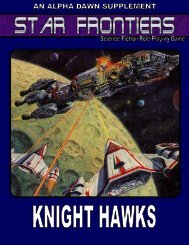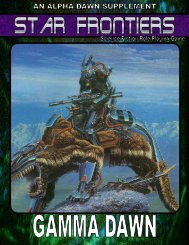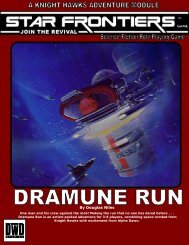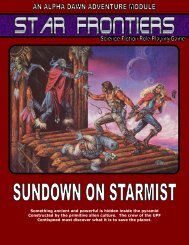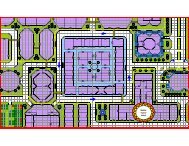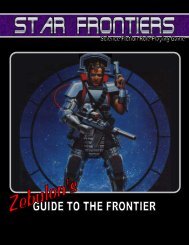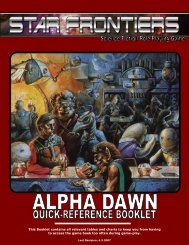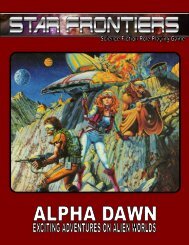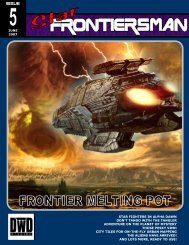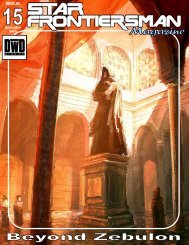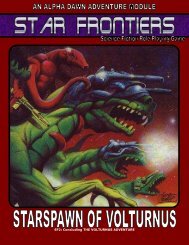Alpha Dawn - Star Frontiersman
Alpha Dawn - Star Frontiersman
Alpha Dawn - Star Frontiersman
You also want an ePaper? Increase the reach of your titles
YUMPU automatically turns print PDFs into web optimized ePapers that Google loves.
Schedules<br />
<strong>Star</strong>ship flights are not always scheduled at<br />
convenient times for the adventurers. If the referee<br />
does not have a specific flight in mind for the<br />
characters, he can roll 3d10 and subtract 3. The<br />
result is the number of days the adventurers must<br />
wait before the next scheduled flight leaves for their<br />
destination. If the result is 0, a starship is leaving<br />
that day.<br />
Layovers<br />
If characters must travel through several star<br />
systems to reach their destination, they probably<br />
will make layovers at each star system along the<br />
way. Unless the starship they are traveling on is<br />
continuing along the same route, the characters<br />
must stop and wait for another scheduled flight to<br />
their next destination. If the characters are working<br />
for a company that is flying them to their<br />
destination, their ship probably will not stop over in<br />
a system for more than one or two days: just long<br />
enough to pick up supplies, fuel and news.<br />
EXAMPLE: Justin Balinar and Sh'Kree Kir must travel<br />
from Cassidine to Athor. Their ship takes seven days<br />
to reach Prenglar. When they arrive, the referee<br />
rolls 3d10 and subtracts three days to see when the<br />
next ship leaves .The result is an 8, so Justin and<br />
Sh'Kree must spend eight days on Prenglar before<br />
leaving for Athor. They can look for a temporary job,<br />
see the local sights, or perhaps get involved in a<br />
short, surprise adventure that the referee has<br />
prepared for them.<br />
Customs, Duties and Taxes<br />
The referee may want to add local baggage<br />
inspections and special visitors' taxes on some<br />
planets. These are not standard, and are left to the<br />
referee's judgment. However, they can lead to<br />
interesting adventures if the characters are trying to<br />
smuggle goods onto a planet or hide from the law.<br />
Local duties and taxes also are a good way to<br />
relieve rich characters of some of their extra cash. If<br />
players ask, the referee should tell them what sorts<br />
of inspections and charges they can expect at their<br />
destination.<br />
TIME IN THE FRONTIER<br />
Galactic Standard Time (GST) is the most popular<br />
time system in the Frontier. The GST system uses<br />
hours, minutes and seconds. An hour is 60 minutes<br />
long, a minute is 60 seconds long. A second is<br />
defined as the length of time needed for a beam of<br />
light to travel 300,000 km through a vacuum.<br />
One year in Galactic Standard Time is 8,000 hours<br />
long. A standard year is divided into 400 20-hour<br />
days. Each day is divided into a 1 0-hour work<br />
period and a 1 0-hour rest period. These<br />
standardized days and years are used mainly for<br />
record-keeping.<br />
Besides Galactic Standard Time, many planets have<br />
their own local time system. These local systems<br />
use GST seconds, minutes and hours, but the length<br />
of the day and year varies from planet to planet.<br />
The length of a local day is the time it takes for the<br />
planet to rotate through one complete day/night<br />
cycle. A local day usually is divided into equal<br />
periods of light and darkness, although these can<br />
vary if the planet's axis is tilted in relation to its<br />
orbit. A local year is the length of time the planet<br />
takes to make one complete revolution around its<br />
star.<br />
LANGUAGES OF THE FRONTIER<br />
Pan Galactic. All intelligent races in the known<br />
galaxy have a native language. In order to simplify<br />
interstellar trade, the Pan-Galactic Corporation<br />
created Pan Galactic, a language of sounds and<br />
gestures that can be spoken by almost any<br />
intelligent, speaking creature. It does not sound<br />
quite the same when spoken by members of<br />
different races, but anyone who speaks Pan Galactic<br />
can understand a creature speaking Pan Galactic.<br />
Because of its usefulness, Pan Galactic is spoken on<br />
almost every world that has contact with the Pan-<br />
Galactic Corporation or one of the four major races.<br />
Alien Languages. The referee can decide that the<br />
natives of some planets do not speak any language<br />
but their own. Aliens that have never met<br />
adventurers or Pan-Galactic traders certainly will not<br />
know how to speak Pan Galactic. This will create<br />
problems for adventurers when they must find a<br />
way to communicate with the aliens.<br />
Learning New Languages. At the start of the<br />
game, all player characters speak their native<br />
language and Pan Galactic. Learning a new language<br />
is like learning a new skill. Each level costs 3<br />
experience points. At level 1, a character will<br />
understand about half of what anyone says in that<br />
language, and has a 50% chance to make someone<br />
else understand what he says. This increases 10%<br />
at each level above 1.<br />
Polyvoxes. A polyvox is a small, computerized<br />
device that translates what it hears in one language<br />
and repeats it in another language. Polyvoxes and<br />
language tapes for all known languages can be<br />
bought wherever general computer equipment is<br />
sold. A polyvox also can learn a new language if it<br />
can be programmed with key phrases, and then<br />
hear the spoken language for d100 hours. More<br />
information on polyvoxes is given in the section on<br />
EQUIPMENT.<br />
79



